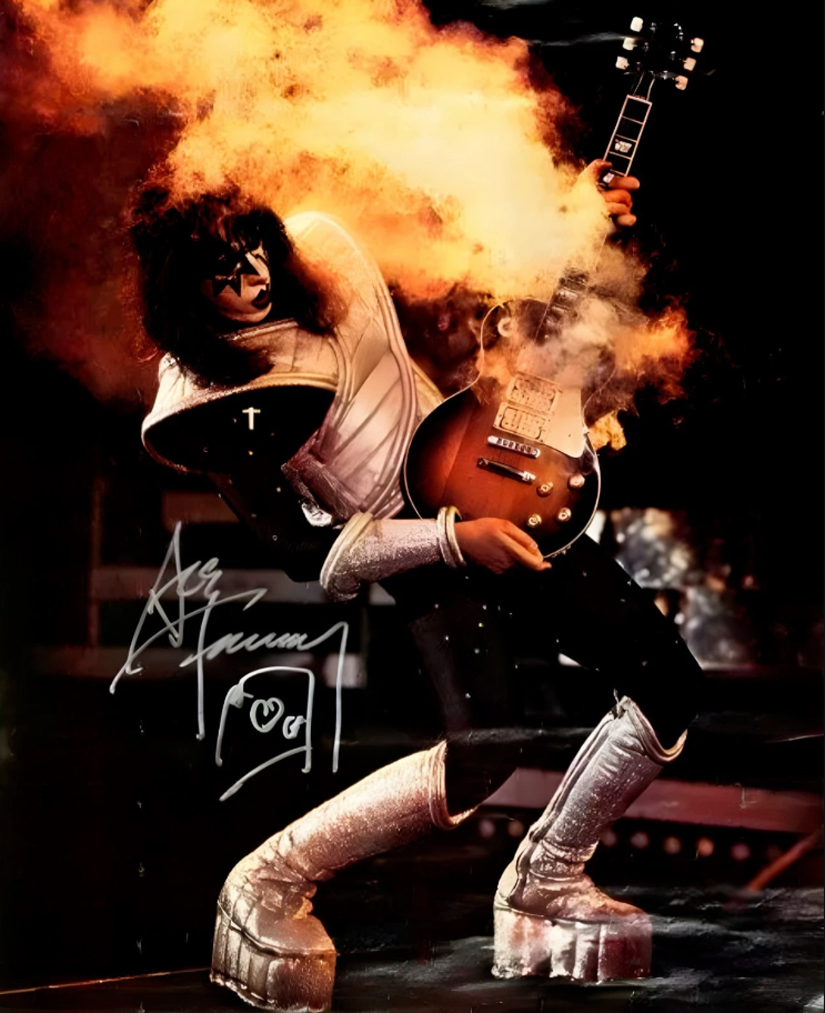KISS has been a musical institution for 50 years. They had phenomenal commercial success, made an indelible mark on popular culture, and are one of a handful of bands that had a profound impact on the way rock music is presented. There is merit in all of the band’s eras, but the original lineup of Peter Criss, Gene Simmons, Paul Stanley and Ace Frehley is firmly ensconced as the iconic visual and sonic version of KISS.
At the center of this, “Space Ace” motivated legions of kids to pick up a guitar (a well-documented fact) because he just made it all look and sound so exciting and dangerous. I chose this poster because it visually sums up these assertions – not to mention that it adorned my bedroom wall for longer than I care to admit. He wasn’t the only guitarist that inspired me, but he was one of those that kept me interested.
Unsurprisingly, the album that introduced me to KISS and Ace was Alive!. His signature was all over it, as evidenced by his lead work on “She”. He didn’t necessarily advance the technical aspects of rock guitar to new heights like players such as Eddie Van Halen, Yngwie Malmsteen and others subsequently would in the 80s, but he did take things up a notch and clearly had a significant influence on those who came after him. He accomplished this by adopting the familiar Les Paul/Marshall combination and licks of the British blues rock masters (Page, Beck, Clapton, Hendrix, etc.) to create his own style. Ace was working in pretty familiar territory and much of what he played may have been heard before, but the way he did it and his conviction were fresh and exciting. He owned his tone, phrasing and massive vibrato, and his lead breaks were mini-compositions in themselves. They meant something in the context of the song – which is the common denominator for all great solos. His leads and songwriting are an essential part of the classic era of KISS; another supporting highlight is his signature lead vocal track and extended solo section in “Shock Me” from Alive II.
After the FREHLEY’S COMET albums, I didn’t follow Ace’s career as closely as I did some of my other guitar heroes but still kept up with his releases. The track that stands out the most to me from his more recent output is his cover of FREE’s “Fire and Water” from Origins, Vol. 1 with Paul Stanely on lead vocals; I thought it captured the magic of the pair in familiar territory. In addition, I always made it a point to read or watch his interviews to get his perspective on his career and the industry – both filtered through his quirky sense of humor and delivery. Overall, what meant the most was that he was happy to be active and in charge of his musical destiny. Similar to Ozzy Osbourne’s final recordings and concert, it was a gift for him and his fans that he was able to release his swan song, 10,000 Volts, and tour on it until right before his passing.
Ace, most of us who admired your work didn’t know you personally, but you still seemed like a longtime friend. You may have returned to the stars, but your legacy and influence remain with us.



Leave a Reply